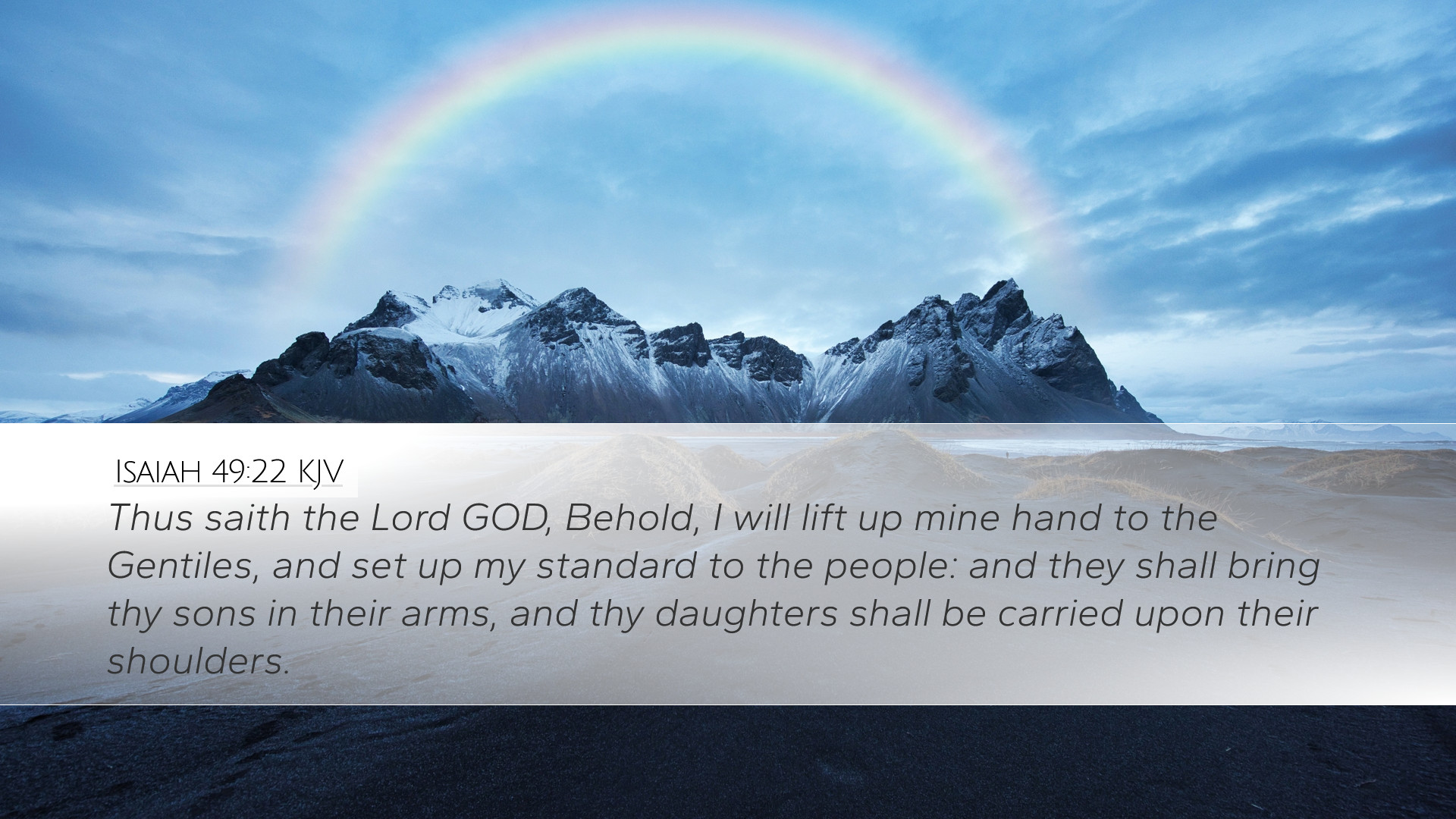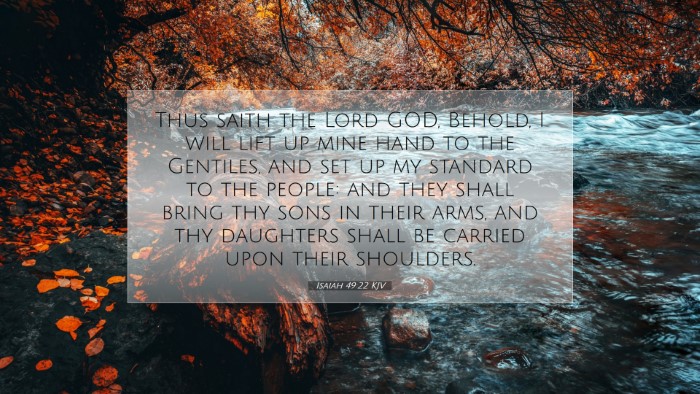Commentary on Isaiah 49:22
Isaiah 49:22 states:
“Thus saith the Lord God, Behold, I will lift up my hand to the Gentiles, and set up my standard to the people: and they shall bring thy sons in their arms, and thy daughters shall be carried upon their shoulders.”
This verse is a profound declaration of God's sovereign intention towards both Israel and the Gentiles. In this commentary, insights from various public domain sources will be synthesized to highlight key themes such as restoration, divine promise, and the eschatological implications of God's plan for His people.
Overview of Context
The Book of Isaiah presents much more than a simple prophetic message; it unfolds a narrative of God's dealings with His people amidst their struggles and eventual redemption. Isaiah 49 is part of the second major section of the book, often referred to as the "Book of Comfort," where the prophet reveals hope against the backdrop of Israel's exile and suffering.
In this chapter, the Servant of the Lord is introduced, representing both Israel and the Messianic figure to come. The selection of verse 22 illustrates God's plan to bring restoration to Israel through outreach to the nations.
God's Declaration of Intent
Isaiah begins this verse with a direct statement from God, signaling a pivotal moment in His divine narrative:
- Lift up my hand to the Gentiles: The imagery here denotes God's authority and readiness to act. Matthew Henry emphasizes that this act embodies God's willingness to include the Gentiles in His salvific plan, thereby inviting all nations to partake in His promises.
- Set up my standard to the people: Albert Barnes interprets “standard” as a banner or signal for the nations, indicating the universal call of God's grace. The standard represents a unifying force that draws people not only to Israel but to the hope that is embodied in the coming Messiah.
- Bring thy sons in their arms: Adam Clarke elaborates on this by noting that the Gentiles will assist Israel during their restoration, signifying an unprecedented alliance and mutual support. Clarke highlights this as a precursor to the unification of God's people in a future age.
The Role of the Gentiles
The mention of the Gentiles in this verse is significant, indicating that God's mercy and salvation are not limited to the Jewish people. The inclusion of the Gentiles hints at an expansive scope of redemption that will be fulfilled through Christ:
- Covenantal Inclusivity: Matthew Henry remarks on the shift from an exclusive, Israel-centric focus to a more inclusive covenant appealing to nations. This reflects the Oracle's announcement of a global mission emphasizing that faith and reconciliation transcend ethnic and cultural boundaries.
- Instrument of Restoration: Albert Barnes suggests that Gentiles play an integral role in the restoration of Israel, indicative of the Church's mission to bring the Gospel to all. This reinforces the church's calling to be a light to the Gentiles, capturing the essence of Jesus' Great Commission.
Symbolic Imagery
The imagery in this verse is rich in symbolism that resonates on multiple levels:
- Carried on Shoulders: The depiction of children being carried reflects God's deep compassion and tenderness. Clarke notes that such an act symbolizes care, protection, and nurturing that God promises to His people as they return home.
- Restoration and Hope: The act of bringing sons and daughters rejoices in the restoration of family and community. This reflects deep theological significance representing God’s ultimate reconciliation of His people to Himself.
Implications for Theological Reflection
Isaiah 49:22 invites deeper theological reflection relevant for pastors, theologians, and students:
- Missional Theology: The text challenges believers to consider their role in the mission of God. The gathered bringing of the nations signifies a divine mandate embraced by modern Christianity—an active engagement in evangelism and outreach to all cultures.
- God's Sovereignty and Agency: It emphasizes God’s sovereignty in orchestrating history towards redemption. The intentionality of His call to the nations underpins discussions about divine providence and the unfolding of His plan through history.
- Hope in Despair: For those facing trials, the proclamation serves as a reminder that God’s plan is at work even in desolate circumstances, providing assurance that He restores and redeems His people, no matter the odds stacked against them.
Conclusion
Isaiah 49:22 is a clarion call echoing God's promise and inclusive grace towards His people and the nations. The verse encapsulates core themes of restoration, divine intent, and hope that are foundational in the Christian faith. By bridging the ancient text with contemporary applications, we find an enduring message that resonates across ages, motivating believers to engage in God's redemptive narrative and to celebrate the beauty of God's expansive kingdom.


